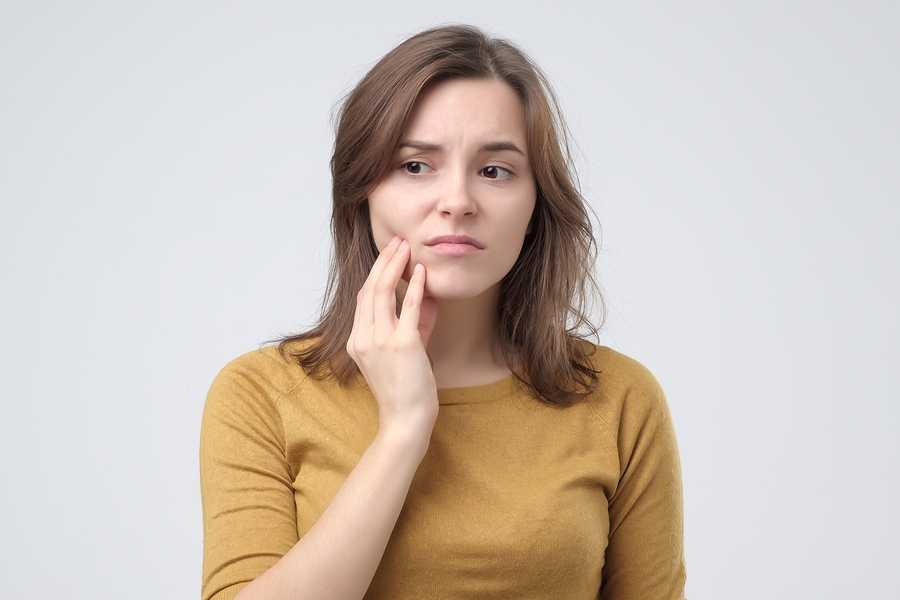Clicking and popping in the jaw—it’s annoying, but is there more to it?
Unfortunately, yes; clicking and popping sounds indicate a dysfunction of the jaw joint, or the temporomandibular joint (TMJ). This dysfunction may be mild or severe and may cause many painful symptoms or just the occasional click. But if you’re experiencing clicking and popping in the jaw, it’s a sign you should pay attention to your jaw’s health. Here’s what you need to know:
TMJ Dysfunction Can Lead to A Variety of Symptoms
Clicking in the jaw is just one common symptom of TMD (temporomandibular dysfunction). Some others include:
- Pain or tenderness in the jaw joint
- Difficulty opening or closing the mouth
- Difficulty or discomfort chewing
- Feeling of the mouth getting “stuck”
- Headaches and migraines
- Pain in the neck, shoulders, or back
- Pain or ringing in the ear
- Multiple dental problems such as broken or chipped teeth, crowns, or root canals
TMD is also associated with bruxism (tooth grinding) and clenching, which can cause or exacerbate TMD.
Why Is My Jaw Clicking in the First Place?
Problems with the TMJ can stem from within the jaw joint itself or from the area around the jaw joint that then stress and strain the jaw. It’s not always possible to figure out the root cause of a patient’s TMD, but here are some of the more common underlying causes.
Bad bite A bite that’s out of alignment is bad for the TMJ because the jaw joint can’t work as designed. Instead, the body compensates for the misalignment by having the jaw joint function in a suboptimal way, which can put stress on the joint itself as well as the surrounding nerves and muscles.
Airway issues A blocked airway during sleep can cause TMD in some cases. When the body is unable to get sufficient air due to an obstructed airway, it may move the jaw back and forth to open the airway further. This puts undue pressure on the joint, which can become inflamed and also leads to grinding of the teeth, or bruxism.
Clenching and grinding due to stress Most bruxism occurs at night when people aren’t aware of what they’re doing, but some people grind during the day due to stress. Grinding the teeth and clenching the jaw both put a strain on the muscles surrounding the jaw joint, which can lead to TMD.
Trauma to the jaw joint Physical injury to the joint from either a fall or a motor vehicle accident, for example, can lead to TMD.
Arthritis A variety of conditions including rheumatoid arthritis, degenerative arthritis, and osteoarthritis can cause TMD through inflammation or degeneration of the jaw joint.
How TMD Gets Worse
Whatever the initial cause is, TMD, like many health issues, tends to get worse if not dealt with properly. This is not only due to the continued stress and dysfunction of the joint that’s caused by the underlying condition but by the response to the TMD itself.
For instance, the underlying cause of the TMD may be a bad bite. It strains the jaw joint, which leads to headaches and shoulder pain. This head and shoulder pain causes discomfort and stress, which the patient unknowingly relieves through clenching and grinding. The clenching and grinding only strain the muscles around the jaw joint more, making TMD symptoms worse. And on it goes.
Getting Treatment for Your TMD
Fortunately, once the underlying problem and contributing issues are identified, TMD can be treated to lessen symptoms. Certain treatment options, depending on the root cause, include:
- Braces, aligners, or other orthodontic treatment to fix a bad bite
- Oral appliance to open the airway at night and stop bruxism
- Medication for arthritis
- Stress management to reduce clenching and grinding
- Surgery in select cases (the last resort)
If you know you have TMD or recognize the symptoms listed above, speak to your dentist about it. They are here to identify and correct what’s causing and contributing to the discomfort so you can eliminate your symptoms and live pain-free.

 Dr. Ami Barakat
Dr. Ami Barakat